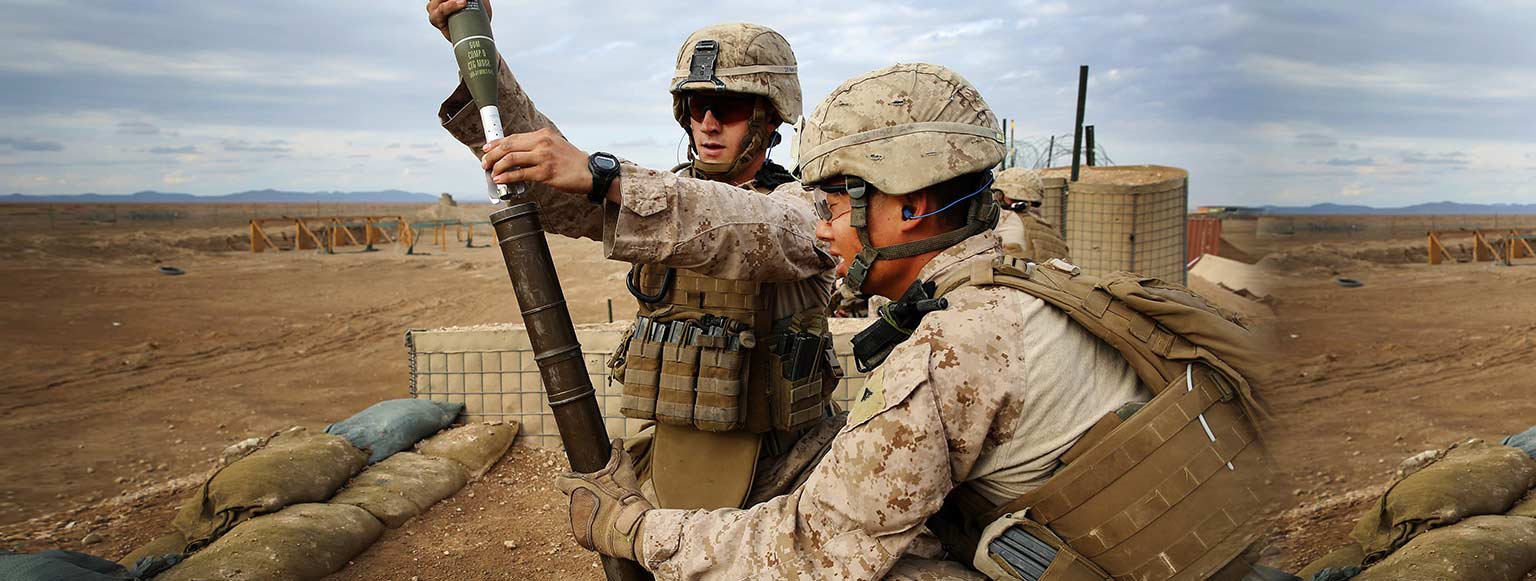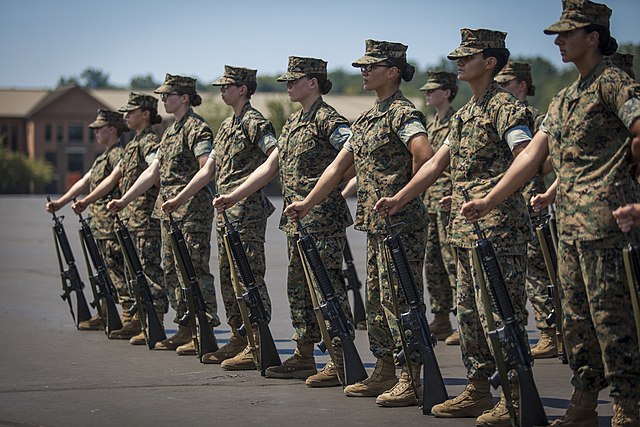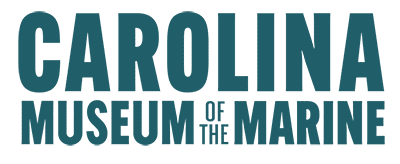Marine Corps Principles and Traits of Leadership, Part 1

The Marine Corps recognizes eleven principles of leadership and fourteen traits of leaders. In this and coming editions of “Front and Center,” we will present these principles and traits, discussing them as the Marine Corps understands them, and considering them in a broader perspective as they apply more generally to Americans whether or not they have served in the military. We will list these principles and traits, and then discuss them now and in the coming months.
Eleven Principles of Leadership
- Know yourself and seek self-improvement.
- Be technically and tactically proficient.
- Know your people and look out for their welfare.
- Keep your personnel informed.
- Set the example.
- Ensure the task is understood, supervised, accomplished.
- Train your Marines (and Sailors) as a team.
- Make sound and timely decisions.
- Develop a sense of responsibility among your subordinates.
- Employ your command within its capabilities.
- Seek responsibilities and take responsibility.

Fourteen Traits of Leaders
- Justice
- Judgment
- Dependability
- Initiative
- Decisiveness
- Tact
- Integrity
- Enthusiasm
- Bearing
- Unselfishness
- Courage
- Knowledge
- Loyalty
- Endurance

As of 2020, there were about 180,000 Marines in the Corps, although there are plans to reduce the numbers a bit. When we consider that there are something more than 325 million Americans, the Marine Corps looks to be quite small, though admirably proficient. One of the important reasons for the remarkable effectiveness of the Marine Corps is its emphasis on the quality of the individual Marine, expressed in part by the eleven principles of leadership and the fourteen character traits of a leader. As we examine these principles and traits, we will get a sense of what it is like for an individual to grow and to develop as a human being, since anyone who will lead others must be able to govern himself.
This idea of governing oneself applies to all Americans because it applies to all human beings, and while governing self comes easier for some than for others, developing this skill is within the reach of everyone. If there’s a catch, it is this: one has to want it. The ancient Greek philosopher Aristotle observed that everything human beings do can be done well or badly. We human beings are the only creatures on earth who are capable of living on purpose, for reasons that make sense to us, and with serious human goals in mind, and we each can do this well or badly. To accomplish these goals we are compelled to cooperate with others who are pursuing their goals, and here we find the need for people individually to be skilled at governing themselves, and able, where necessary, to lead others.
In pursuit of this development of the self we have the first principle of Marine leadership: Know yourself and seek self-improvement. The explanation of this principle begins this way. “There is perhaps nothing more important for a leader than being able to recognize their [sic] own strengths and weaknesses. Leaders must be able to grow, change, and adapt.” There are few abilities more beneficial to a person than being able to examine himself honestly. The concerns here, of course, are the possibility of being insufficiently honest with oneself, and thus failing to see what needs improvement in the moment, or being overly harsh with oneself and becoming discouraged. People for whom self-reflection does not come naturally need to be aware of these possibilities in order to make success more likely over time. In short, we do well to follow the advice of the Marine Corps and seek to understand our individual strengths and weaknesses, developing the strengths and strengthening the weaknesses. As the Marines put it, leaders, and Americans more generally, need to be able to grow, change, and adapt.
Growth is a kind of change along a more-or-less unbroken trajectory from less developed to more developed. When we think about growing as a person, what is it that is being grown? What is being grown is our nature as human beings. One of the very interesting questions that has occupied a surprising variety of people over our history is human nature. What is it? We may confidently say this much, that is, that our natures are moral and intellectual and so the process of growth requires strengthening our wills, the moral part, and strengthening and informing our minds, the intellectual part. Importantly, as our minds grow we not only know more, but we become ever better at the all-important skill of thinking. In turn, we are better able to guide our decisions, taking ever better ones to the development of our wills.
Change is just that, change. While we may think of growth as a kind of change along a common path, change as such may be understood as leaving one path and choosing another. We must be willing to change. That is, one has to be willing to admit a bad habit when it is spotted and change it. In this way, one becomes different by degrees. Someone who becomes increasingly better at his craft or intellectual discipline through practice and study becomes different by means of becoming better. Someone, for example, who has the habit of telling lies to make himself look good to others and then comes to see this habit as a vice and corrects it, becomes, in a very real way, someone different and better than he was. The willingness, actually the desire, to grow and to change is the engine that drives development of the skill of governing oneself, and people who have learned to do this are able swiftly to adapt to changing circumstances because adaptation is not so much change as it is applying to a new situation abilities one already possesses but are now, in this new situation, called into action.
Justice is the first of the traits of a leader, and one might be excused for thinking that it is a difficult concept to define. For Marines, justice must be understood as a quality of a leader interacting with subordinates, and in this context, justice is fairness in assigning tasks and in correcting mistakes and acts of wrong-doing. To some people, this definition might seem a bit thin, and it is, but it is important for an institution with a mission as serious as that of the Marine Corps. Marines are called upon at times to risk their lives in the accomplishment of a mission. At all times, Marines are in the profession of training for this possibility. Each Marine must maintain him- or herself in a state of mental and physical strength and readiness, that is governing oneself, and training effectively to contribute to the unit of the Corps to which he is assigned, ready to lead or follow as the assignment designates.
An important element of the effectiveness of the Marine Corps is esprit de corps, which may be understood as a devotion among Marines to the mission of the Corps, and enthusiasm borne of the sense of comradeship and belonging that a high and common mission instils in them. Few things will destroy that sense of pride and duty than injustice in the ranks, but when it is clear that leaders treat their subordinates fairly, the indignation produced by injustice finds no traction even when someone is being disciplined for errant behavior.
This idea of justice as fairness is fundamental among human beings. As children, we all were sensitive to unfair treatment by parents, teachers, and others. This is the idea behind the blindfold worn by Lady Justice. This understanding of justice is not new. Among Greeks of the ancient world, the first definition of justice is to give to each person his or her due. That is, justice requires us to render to those around us what is due to them, and this is why the 18th century German thinker Immanuel Kant contended that when we fail to punish criminals according to the prescription of law, we treat the criminal unjustly, because the punishment is what is due to him.
So, what is due to each person? The idea looks to be simple and clear, but it is more complicated than it appears, as the assertion about justice and criminals advanced by Kant suggests. The idea is ancient among us that justice is the most important of the virtues because it is the virtue that guides our actions one with another in society. Aristotle (d. 322 B.C.) argued that we human beings possess language in part so we can discuss ideas of justice among ourselves. This points to the importance of conversation more generally in the life of a healthy society. When people are able and willing freely to discuss ideas with one another, and willing both to tolerate and to understand disagreement, they are well positioned to behave justly with each other and to maintain justice in their social institutions. Happily, and it appears the Marine Corps has arrived here already, when people conduct themselves with justice in their dealings with each other, the conditions are created in which each individual can come to know himself, and can seek improvement.
A presentation of the principles and traits of leadership in the Marine Corps may be found here:
https://www.operationmilitarykids.org/usmc-leadership-principles-explained/
A more technical discussion of the principles and traits of leadership may be found here: https://www.trngcmd.marines.mil/Portals/207/Docs/FMTBE/Student%20Materials/MCECST/A_Marine_Corps_Leadership_SO.pdf?ver=K2U1BPjogyG8MCPoiAExcA%3d%3d
Kant was not deaf to the importance of mercy, but meant simply that in the normal course of social life, criminals deserve the punishment they receive.
Of course, as with any interesting and important assertion, people will, and we may say that people should, dispute it.

